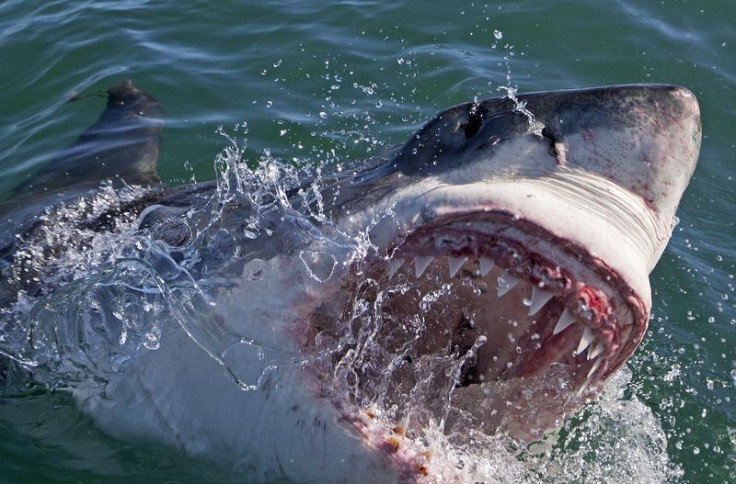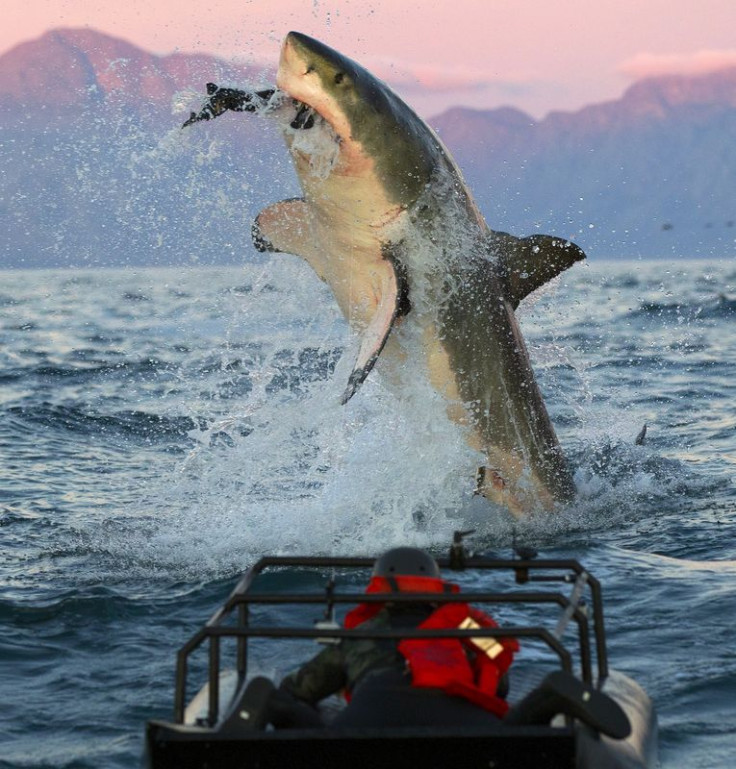Shark Week 2014: The Good, The Bad And The Bloody; Shark Expert Gives Pros And Cons Of Discovery Channel's Popular Series

Discovery Channel will be celebrating Shark Week’s 27th anniversary when the exhilarating series returns for its 2014 season on Sunday, Aug. 10. So make sure you mark your calendars because soon enough you’ll be peeking through your fingers to watch some of the ocean’s fiercest predators when “Air Jaws: Fin of Fury” kicks off Shark Week at 8 p.m. EDT.
[Check out all of the 2014 Shark Week programs here!]
Sounds terrifying, right? Well, according to reports, frightening viewers with gruesome footage, seal-devouring footage wasn’t the original mission Discovery Channel had in mind when the idea for Shark Week was first cultivated.
The summer series, which premiered 13 years after Steven Spielberg’s “Jaws” sparked the public’s curiosity in sharks, was initially created in 1988 to bring awareness and respect to the creatures who swim in the same ocean as us. But fast forward 27 years later and some shark advocates would say that the evolution of Shark Week has turned into a hinderance to conservation efforts due to its shocking features.
Sonja Fordham, a marine biologist and founder of Shark Advocates International, spoke with the International Business Times in an exclusive interview on all things Shark Week, where she shared both her negative and positive views on cable’s longest-running programming event.
Fordham explained that prior to sinking her teeth into a life of protecting sharks in 1991, she spent her days working with marine mammals, which is where she found her sea legs.
“I was like a ‘Save the Whales’ kind of person,” she laughed.
But Fordham’s love for dolphins and whales was put on hold when she realized how desperate sharks were in need of a supportive voice. The activist divulged that while mammals were protected under the Marine Mammal Protection Act, sharks were being legally fished and finned in the Atlantic ocean.
“It was basically a free-for-all,” she explained. “I knew from studying marine biology that these animals had similar reproductive strategies. They’re both generally slow-growing and reproduce more like humans then fish.”
Because there were no laws that protected sharks like there were for mammals, Fordham decided to roll up her sleeves and “stay in the fish program to focus on sharks.”
“They were in much greater need of an advocate -- comparably speaking,” she said.
Fordham revealed that one of her advocacy efforts included working side-by-side with Discovery Channel to bring informative and engaging features during a previous Shark Week.
“We did a series of multiple choice questions that had to do with conservation during the commercial breaks. We also did games and online like quizzes,” she said, laughing as she reflected that her projects might have seemed a bit “boring” compared to the breaching great whites.

“Overall it’s important to remember that Discovery Channel is probably going to focus on what’s going to draw viewers, right? There’s no question that a part of people’s fascination with sharks has always been the potential danger. The fear of an ‘attack,’ which we like to call shark bites now. But that’s always been throughout the decade of special focus of Shark Week -- the risk of shark attacks,” Fordham explained of why the show has thrived off of making us shudder with terror year after year.
After Shark Week's first season, the prime-time rating nearly doubled Discovery Channel's normal prime-time average. And no, it doesn't look like as if the show's popularity is slowing down any time soon -- especially not when programs leave you second-guessing yourself about whether taking a dip in the ocean is OK.
Just take a gander at the top 10 rated Shark Week programs over the past 26 seasons. Can you find the theme? (*Denotes programs that are tied)
1. “Megalodon: The Monster Shark Lives” (2013)
2. “Ocean of Fear” (2007)
3. “Anatomy of a Shark Bite” (2003)
4. “Returns of Jaws” (2013)
5. “Voodoo Sharks” (2013)
6. “Great White Serial Killers” (2013)
7. “Ultimate Air Jaws” (2013)
8. * “Great White Invasion” (2011)
9. * “Jaws Comes Home” (2011)
10. “Air Jaws: Sharks of South Africa” (2001)
Despite Shark Week’s bloody appeal, Fordham recognized that the series has a “decent track record in terms of featuring some really prominent shark scientists.”
“But in order to stay in business Discovery Channel is going to have to reflect the public’s attitude and showcase what the public finds most intriguing. I do think they try to slip in the conservation issues sometimes in the side,” she admitted. “Their approach to conservation is -- I’ve seen as up and down over the years. They receive a lot of criticism for conservation community over the years. So, responding to that criticism while also maintain ratings is what they try to balance.”
Fordham elaborated on the topic by explaining several different efforts have criticized Shark Week by pointing out that the series focuses “too much on shark attacks.”
“People from the conservation community have let Discovery Channel know that they’d like more conservation programming and less focus on the attacks,” she said.
The Shark Advocates International President went on to say that one of her favorite non-fear inducing Shark Week programs was Discovery Channel’s “Ultimate Guide to Sharks.”
“Last year I remember being impressed that they featured a special on deep sea sharks, which generally don’t get enough attention so I was pleased to see that,” Fordham confessed, continuing her positive views on Shark Week by explaining a major upside to the show, “regardless how you feel about the programming,” is that it’s an effective way to get people talking about sharks.
“It provides a really terrific opportunity for all types of people to link to Shark Week and use that as a platform to get out their messages and perspective. It provide opportunities and I think those are ever-increasing with social media,” she said.
According to Discovery Channel, the 2013 Season of Shark Week was the series’ most social programming event to date with 4.3 million @SharkWeek tweets, nearly 3.4 million discovery.com Shark Week video streams and 21.8 million people took to Facebook to discuss their Shark Week obsessions. #TalkAboutAHotTopic
But now that the can of sharks has been opened is it safe to say that Shark Week is shedding a positive light on the way the public views the animals -- despite the fearful twist of the programs?
“Well, it’s really hard to tell. There’s good things and bad things,” Fordham said. “Talking about sharks, providing all types of people and interest groups to get out their messages tied to this global event -- one time a year we’re all focused on sharks -- so that can be very positive if we capitalize on that. But then of course the negative image, the perpetuation of the fear of sharks, does not help shark conservation. It’s a pretty outdated view to see sharks as killing machines or serious threats to beach goers. That negative imagery doesn’t help in help of advancing shark conservation policies.”
Overall, Fordham has acknowledged that despite the negative aspects of Shark Week, the long-running series has “given people who are interested in shark conservation a great opportunity to voice their concerns and get out specific information to all the people who are tuned in.”
“I think it’s clear that the public’s attitudes toward sharks are changing a great deal for the better,” she said. “I think the challenge now is that now we have more people who are fans of white sharks and interested in conservation of the big, photogenic sharks the challenge is to get public concern for the smaller specifies that don’t usually end up on the Discovery Channel -- like flat sharks, which are also known as rays. They are more threatened and less protected. So that’s our next step for conservation now that a lot more people are interested in helping white sharks we have to sort of spread the love.”
Fordham then joked that she’s crossing her fingers that one day, Discovery Channel might launch a “Ray Week.”
Season 27 of Shark Week will premiere on Discovery Channel on Sunday, Aug. 10, at 8 p.m. EDT. Do you agree with Fordham’s view on Shark Week? Sound off in the comments section below whether or not you believe the Discovery Channel is detrimental to sharks or a positive factor on the marine animals.
© Copyright IBTimes 2024. All rights reserved.











